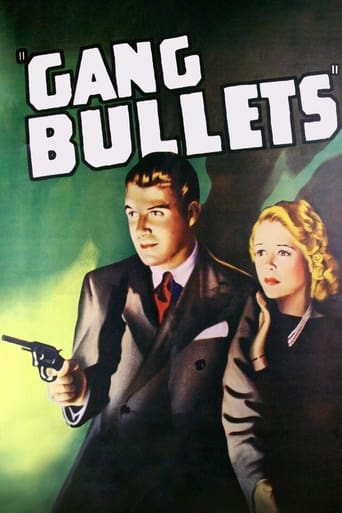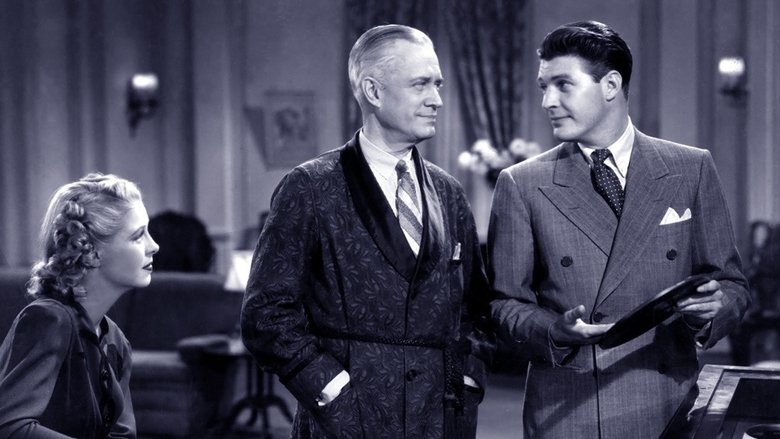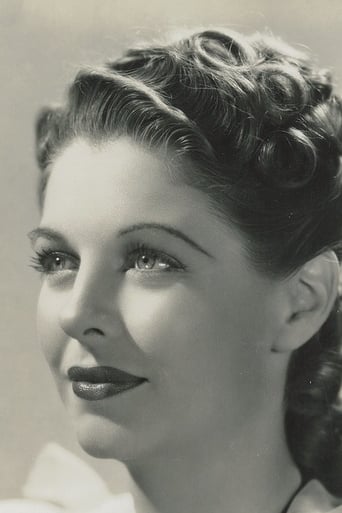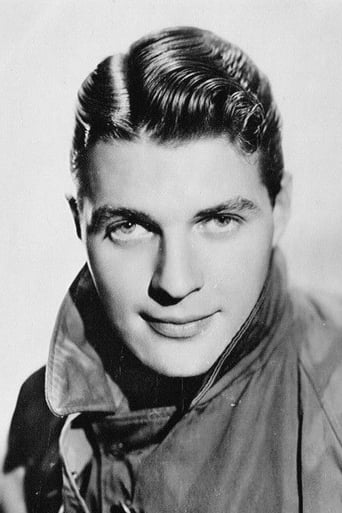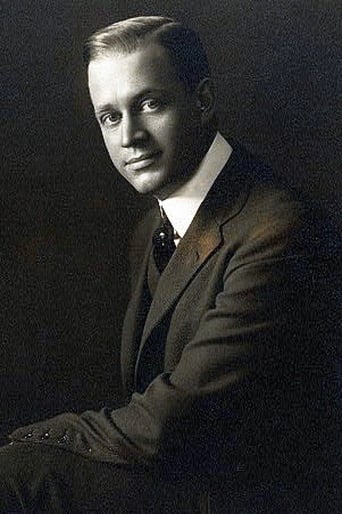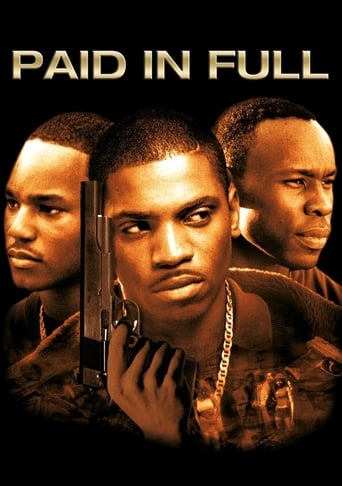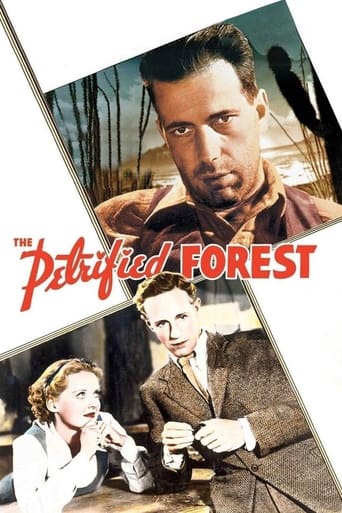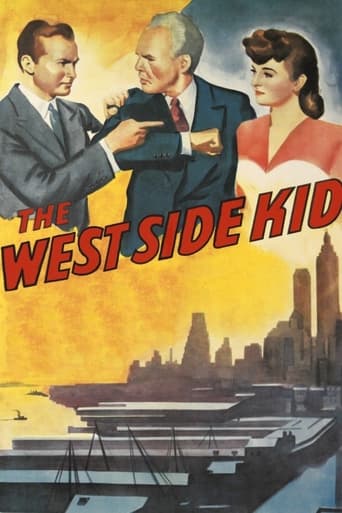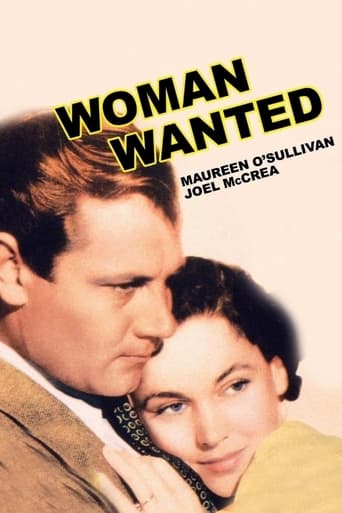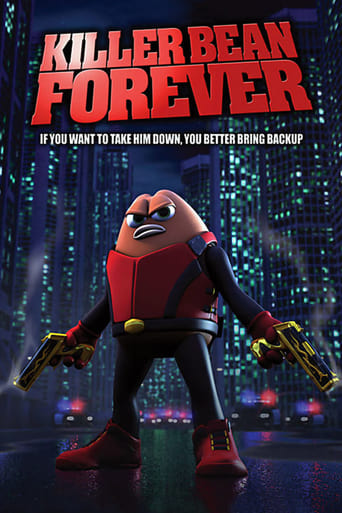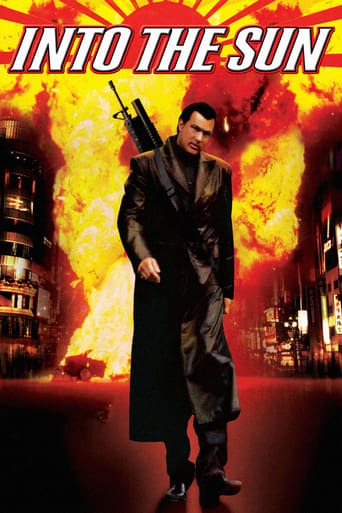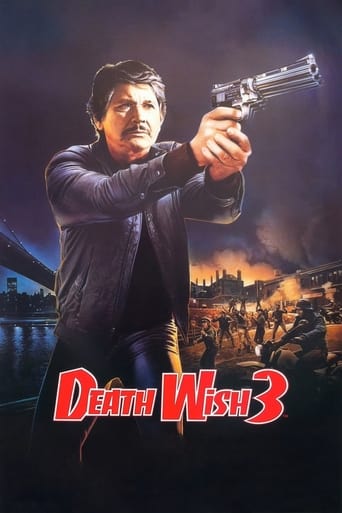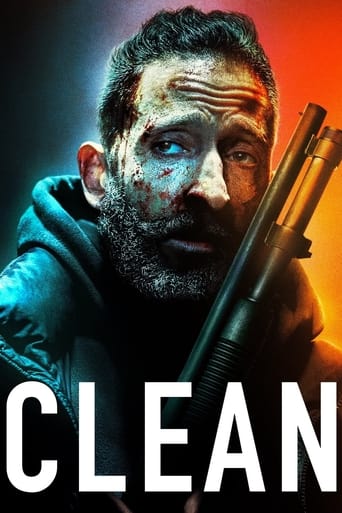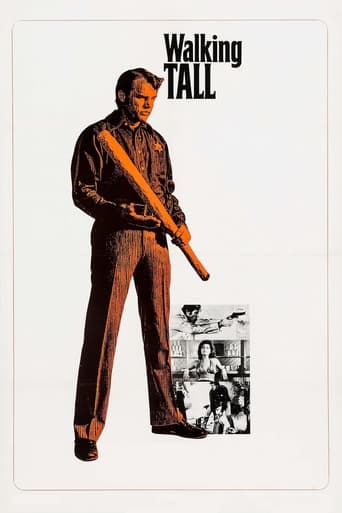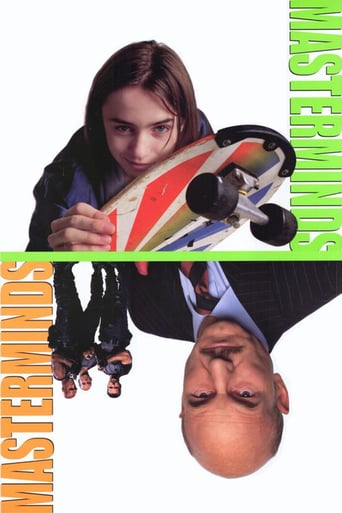Gang Bullets (1938)
A Capone-like racketeer named Anderson, who after being chased out of one town by the authorities immediately sets up shop in another. Unable to get any tangible evidence against Anderson, DA Wayne orders his assistant Carter to dig up some dirt on the gangster boss. To do this, Carter pretends to turned crooked, joining Anderson's gang in order to accumulate evidence. Alas, Carter's girl friend Patricia knows nothing of her boyfriend's subterfuge, and she suspects the worst.
Watch Trailer
Cast


Similar titles
Reviews
Simply A Masterpiece
Good movie but grossly overrated
The acting in this movie is really good.
By the time the dramatic fireworks start popping off, each one feels earned.
GANG BULLETS is a low rent mobster story from cheapie studio Monogram Pictures, notorious for making endless B-movies on a shoestring. This film's about the efforts of an entire city's law and justice departments to bring a notorious criminal to book. Morgan Wallace plays said criminal, 'Big Bill' Anderson, with relish and certainly dominates the film with his larger-than-life persona. I loved the sly joke when he tells the cops that his tax records are up to date so they can't bring him to book.With a running time clocking in at just over an hour, GANG BULLETS is never boring for a moment and the plot constantly twists and turns as first the cops and then the criminals get the upper hand. The usual clichés of the gangster genre are played out here, including protection rackets, stings, and shoot-outs, and they're all handled with surprising aplomb given the paucity of the budget. The film lacks any big-name actors for recognition but works anyway despite this.
"Dracula's Daughter" director Lambert Hillyer and prolific scenarist John T. Neville have concocted a compelling little crime thriller. A virtuous district attorney tangles with a nefarious gangster but the gangster knows how to control the law to serve his own interests. The refreshing thing about this Monogram Pictures release is not only its level of intelligence but also its candor in documenting the fragility of the criminal justice system. The producers open "Gang Bullets" with this solemn preamble that serves as a disclaimer of sorts: "This picture is dedicated to those public officials whose duty it is to combat crime. The greatest shield to the modern criminal is the law which declares him innocent until proved guilty. The late William Howard Taft, Chief Justice of the U.S. Supreme Court, in an address said: "The administration of the criminal justice in this country is a disgrace to civilization. The trial of the criminal seems like a game of chance—with all the chances in favor of the criminal, if he wins he seems to have the sympathy of a sporting public." "Gang Bullets" reminded me of director Don Siegel's "Dirty Harry." Like "Dirty Harry," "Gang Bullets" argues that the criminal justice system is too lenient on criminals. Essentially, this violent melodrama adheres to a code of rules, and survival amounts to a chess match between Good and Evil.The action unfolds when two mob gunmen take a squealer for the last ride. Of course, we aren't shown the murder, but we can hear the gunshots off-camera. Although he pleaded they release him for the sake of his wife and children, these heartless hoodlums knock him off. No sooner has this killing happened than the Police Commissioner R.D. Brown receives a call from the press. "You newspaper guys give me a pain. Certainly I know 'Big Bill' is in back of this. I can't arrest a person because I think he's a murderer. You fellas can print rumors; I have to prove a murder charge." One of Brown's detectives enters and reports 'Big Bill' didn't lose his nerve when they showed him Trent's dead body. "We'll have to catch that bird in the egg," Brown observes. "That's not so easy," Detective Craig complains, "so long as he has others do his killings. Craig surprises Brown with news he still has 'Big Bill' in custody. "Take him down to the midnight train," Brown instructs. "I'm getting in touch with every chief of police for the next thousand miles to see that you don't get off that train." Brown orders Craig to take Anderson out the back door so that Anderson's attorney doesn't see them.'Big Bill' Anderson (Morgan Wallace) is a cunning crime czar who always lands on his feet. He spins a murderous web of corruption, larceny, deceit, and anarchy. He is wise enough to let his henchmen perform the dirty work so he cannot be convicted for what they do. 'Big Bill' is so shrewd that he pays his income tax so as not to suffer the fate that befell Al Capone. After Police Commissioner Brown sends 'Big Bill' packing out of town from one town to another, the villain exploits the leniency of law to get off the train at Bridgetown and sink his tentacles into what he calls a "dead" town. "I can't chase Anderson out of town until Reardon gets something on him," laments District Attorney Dexter Wayne (the ever reliable Charles Trowbridge) to Assistant District Attorney John Carter (Robert Kent). During their first meeting, Anderson displays his knowledge of criminal law to Wayne, "I've always been interested in our Constitution. They must have been thinking of me when they added that bill of human rights. Article Four, the right of people to be secure in their person. Article Five: No person shall be held for a crime unless on indictment by a grand jury. Article Six, in all criminal prosecutions, the accused shall enjoy the right to be informed of the nature and the cause of the accusations, to be confronted with the witnesses against him, and to have counsel for his defense." The Police Chief comments, "That's a bill of human rights never meant to protect human rats." Anderson retorts, "And to think some of our best citizens use it to hide their skulduggery." Wayne warns Anderson that Bridgetown won't be healthy for him.Nevertheless, 'Big Bill' resurrects the gambling dens. Initially, instead of averaging 70 per cent of the profits from gambling, he decides that they should give the suckers 70 per cent because they can get them back later. "You fellows must remember one thing: It pays to advertise," 'Big Bill' advises them. "What do you think put over every successful business: advertising. In our business, we cannot run newspaper ads, but we can get them talking about us. Let'em win, fifty, they'll brag it was a hundred. The next one will say it was a thousand. Everyone who hears about it is a new sucker. They'll be mortgaging them homes for us to make easy money." 'Big Bill' vows, "When I get through with this half-baked hamlet, it will be a live city." Consequently, the authorities find themselves between a rock and a hard place with the elusive 'Big Bill.' "You cannot expect us to fight crime with the kind of laws we have to work with," complains Assistant District Attorney Carter. "It's like hunting tigers with bean-shooters. You think criminals made these laws to protect themselves." The fun of "Gang Bullets" is the heroes and the villains are evenly matched and smart as whips. One of the least believable plot points involves the way that the assistant district attorney obtains a recording of a conversation between Dexter Wayne and Anderson. Despite its obvious low budget, "Gang Bullets" is a swiftly paced, hard-hitting, thriller with a surprise or two and an amusing attitude that it takes to itself.
***SPOLIERS*** One of many Monogram Pictures contribution to fighting crime in the thirties, before the company went into horror films. "Gang Bullets" has to do with how the law is tilted on the side of the criminals and how a crusading and clever D.A turned the tables of a group of ruthless mobsters by almost becoming a member of their gang.Having been run out of a number of towns big time gangster Big Bill Anderson, Morgan Wallace, finally settles in this unnamed city where he quickly and secretly sets up his organization. Bill Bill's syndicate terrorized everyone from the local cleaners and grocery store owners to the mayor himself.Big Bill Anderson had learned over the years to stay out of the limelight by letting others, in his criminal organization, do the walking and talking as well as dirty work for him. Smart enough to hire himself a top criminal lawyer Meade, John T. Murrary, Big Bill is even immune, something that even the infamous Al Capone wasn't, from the feds by carefully paying his income tax and keeping records of all his receipts from the tax department to keep it off his back.Making a shambles of the city's law enforcement agencies it begins to look like Big Bill would never be stopped from doing his dirty dealing as organized crime engulfs the entire metropolis. Big Bill's crimes syndicate uses shake downs, or protection rackets, and has bordellos and illegal gambling dens sprouting up all over the city with the law, unable to pin Big Bill & Co down with an indictment, helpless to stop or run them out of business.City D.A Dexter Wayne,Charles Trowbidge, frustrated with his inability to get anything on Big Bill devises a secret plan to get the arrogant hood with his pants down by plying into his hubris and sense of invincibility. The plan would expose D.A Wayne to criminal prosecution himself and even death at the hands of Big Bill's gang if they ever should find out that he's setting them up.Having a secret meeting with Big Bill D.A Wayne agrees to take a $10,000.00 bribe from him to lay off his boys and with everyone expecting Wayne to be thrown out of office in the coming elections he's assured by Big Bill that he'll have a place in his organization as one of his high paid legal mouthpieces.Unknown to Big Bill is that D.A Wayne's assistant and future son-in-law John Carter, Robert Kent, had secretly recorded his conversation with the D.A not knowing that his boss, the D.A Wayne, is throwing in his lot with the Big Bill Gang. Hurt and distraught D.A Wayne's daughter Pat, Ann Nagel, after listening to the secret Dictaphones recording of Big Bill and her dad breaks the record in half destroying it so the facts on it wouldn't be made public. Unknown to her an unknown news source, code named Julius, reported the entire story to the newspapers leaving John Carter no choice to indite both Big Bill and his boss and future father-in-law D.A Wayne for extortion and bribery.It's only after when D.A Wayne and Big Bill break out of police custody that the truth comes out to D.A Wayne's true motives. As the police and assistant D.A Carter race against the clock to not only capture Big Bill before he takes off, on a private plane, to South America as well as double-crosses his partner in crime the disgraced D.A Dexter Wayne by blowing him to pieces in his hide out leaving nothing of the D.A left to be buried.Predictable ending with Carter and the cops getting to the hideout just in time. With Big Bill not only getting arrested together with his gang of hoodlums but, with the help of the undercover D.A Wayne, being caught with the goods on them making the law, for once in the movie, work on the side of those who observe it not break it. And yes it was non-other then D.A Dexter Wayne himself, using the news reporter pseudonym Julius, who leaked the story about himself taking a bribe from Big Bill. This was to get on his good side and make the big guy think that he's got the goods on him. When in truth it was Dexter Wayne that got Big Bill to let his guard down and thus set him up for the big fall at the end of the movie.
After watching this recently, it really dawned on me the big gap between crime stories on film of the 1930s to ones made from 1940 on. The '30s look and sound so more dated than ones just a half dozen years later. Part of that is good because the 1930s expressions are fun to hear and the films are shorter and faster-paced, and a bit edgier.The cops that appear are really different. Even though there is a lot of moralizing - which is fine with me, such as prefaces right before the feature warning of the dangers of crimes and having criminals glorified, the films themselves actually make the cops look like thugs as well as the criminals! The police are shown treating suspects as if they are already convicted felons, roughing them up, denying them a lawyer, detaining them illegally, etc. - and they are supposed to be the good guys?! I am no Liberal by a longshot but no wonder laws were put in to protect average citizens from the police, if that's the way things were. In fact, I was shocked to hear the term "police brutality" in this movie. I always thought that expression came from the 1960s, but here it is in a 1938 film. However, in an interesting twist, in this film two crooks fake "police brutality" to get out of testifying before a grand jury against their vicious gangland boss. Interesting things happen after that, and this film gets better and better as it goes on. The main crook, played by Morgan Wallace, is really fascinating in his brutal attitude. At least they still made the bad guys worse people than those 'brutal' cops.These '30 gangster movies. may be hokey, corny, extremely dated and inadvertently not favorable to the police here and there, but they don't mess around by being too talky. They get to the point and they are simply fun to watch. Note: The IMDb board here hasn't listed this as available on DVD but that's how I watched it yesterday. It's part of a 4-film DVD pack entitled "Mobster Movies."

